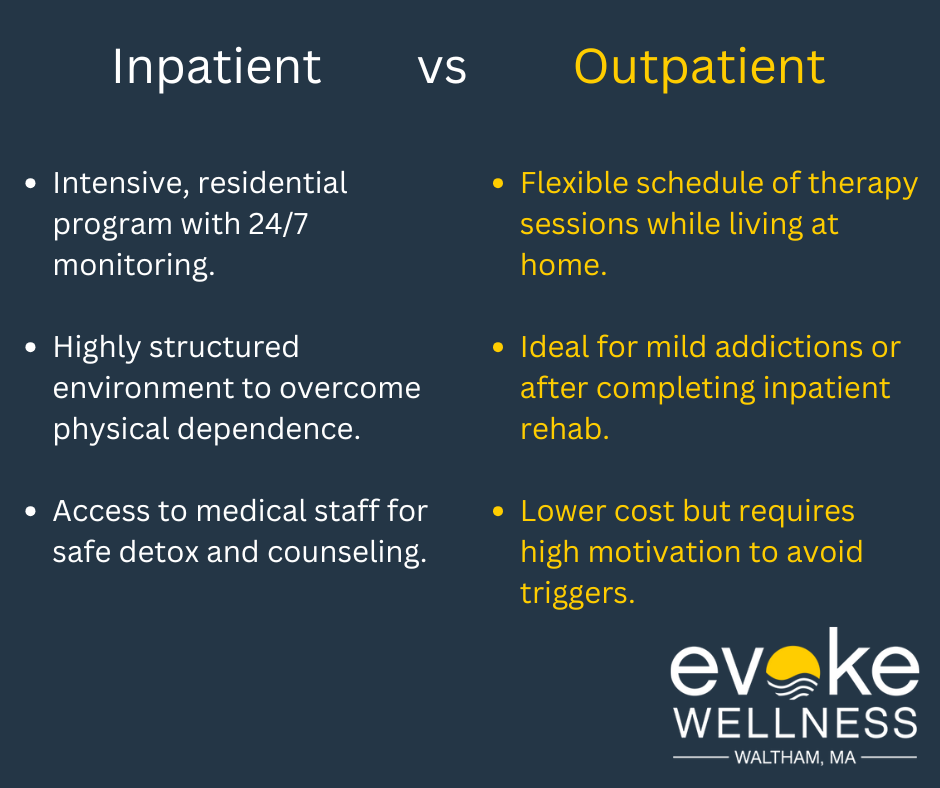When you’re ready to seek help for addiction, choosing the right treatment path is crucial. With over 20 million Americans battling substance use disorders in 2021, understanding your options is more important than ever. Inpatient and outpatient addiction treatments offer distinct approaches, each with its own benefits and challenges. Recent studies show that while inpatient care can be highly effective, with success rates up to 68%, outpatient programs are becoming increasingly popular, accounting for 90% of treatment admissions. As you embark on your journey to recovery, it’s essential to weigh these options carefully, considering factors like the severity of your addiction, your support system, and your daily responsibilities.
Call us at (833) 287-7223 today or reach out online.
Understanding Addiction Treatment Options
Inpatient Treatment
- Intensive, residential program with 24/7 monitoring.
- Highly structured environment to overcome physical dependence.
- Access to medical staff for safe detox and counseling.
Outpatient Care
- Flexible schedule of therapy sessions while living at home.
- Ideal for mild addictions or after completing inpatient rehab.
- Lower cost but requires high motivation to avoid triggers.
With different time commitments and levels of support, you can find an evidence-based program tailored to your needs. Discussing your specific situation with an addiction specialist will help determine the best treatment option.
What is Inpatient Addiction Treatment?
Intensive, Round-the-Clock Care
Inpatient or residential treatment provides 24/7 comprehensive care for substance abuse. You live on-site in a facility, removing access to drugs/alcohol and negative influences.
Structured Environment
The highly structured environment includes individual/group therapy, support meetings, behavioral modeling and more. Each day follows a set schedule tailored to your recovery needs.
Medical Monitoring
For those with severe addictions, inpatient allows close medical monitoring and management of withdrawal symptoms. On-site nurses and doctors ensure your safety.
Length of Stay
Inpatient programs typically last 30-90 days, though this can vary based on your situation. Longer stays are associated with higher success rates for lasting sobriety.
Benefits of Inpatient Treatment Programs
Safe, Supportive Environment
Inpatient rehab provides a secure, substance-free setting away from temptations and triggers. 24/7 supervision and peer support foster healing.
Comprehensive Therapies
You’ll have access to evidence-based treatments like cognitive behavioral therapy, individual/group counseling, and holistic approaches. The intensive care is tailored to your needs.
Focus on Recovery
Living on-site allows you to fully concentrate on getting well without everyday distractions. The highly structured routine promotes personal growth.
What is Outpatient Addiction Treatment?
Outpatient addiction treatment provides therapy and support services while allowing you to live at home. This flexibility makes it ideal for those with mild addictions or obligations that prevent inpatient care.
Key Benefits
- Maintain work, family, and social commitments
- Lower cost than inpatient programs
- Apply coping strategies in real-world settings
Treatment Modalities
You’ll attend regular counseling sessions and support group meetings. Cognitive behavioral therapy helps identify triggers and develop healthier patterns.
Duration and Intensity
Outpatient programs typically require 10-12 hours per week over 3-6 months. However, more intensive options like partial hospitalization or intensive outpatient are also available depending on your needs.
Benefits of Outpatient Programs
Lower Cost
One major advantage of outpatient treatment is the significantly lower cost compared to inpatient rehab. You can continue living at home and potentially keep working while receiving treatment.
More Flexibility
Outpatient programs offer more flexibility to fit your schedule. Treatment sessions are scheduled around work or childcare needs, allowing you to maintain your daily routines and responsibilities.
Apply Lessons Directly
As you learn coping strategies and life skills in outpatient treatment, you can immediately apply them to real-world situations you face day-to-day. This reinforces long-term recovery.
Support Network
Outpatient care allows you to maintain your existing support system of family and friends during treatment. Their involvement is key for achieving lasting sobriety.
How to Choose Between Inpatient and Outpatient Rehab
Assess Your Needs
Evaluate the severity of your addiction and any co-occurring mental health issues. Inpatient rehab provides intensive, around-the-clock care ideal for severe addictions or complex cases. Outpatient programs allow more flexibility for milder substance abuse.
Consider Your Circumstances
Look at your home environment, support system, and scheduling constraints. Inpatient care removes you from triggers but restricts work and family obligations. Outpatient rehab enables you to maintain responsibilities while receiving treatment.
Weigh the Costs
Inpatient treatment is generally more expensive due to housing and amenity fees. Many outpatient programs are more affordable but may involve higher out-of-pocket medication costs. Check what your insurance covers for each option.
The optimal rehab setting depends on your individual situation. Discuss your needs thoroughly with an addiction professional to make the most informed choice.
Inpatient Addiction Treatment FAQs
What is inpatient treatment?
Inpatient or residential treatment provides 24/7 comprehensive care. You live onsite, allowing you to focus solely on recovery without outside distractions or access to drugs/alcohol.
Who needs inpatient care?
Those with severe, long-term addictions, co-occurring mental health disorders, or an unstable living environment typically require the intensive care of an inpatient program.
What happens in treatment?
Evidence-based therapies like cognitive behavioral therapy, family counseling, and medication management help identify addiction triggers and develop coping strategies. Holistic care like nutrition education and exercise therapy also support recovery.
How long does it last?
Inpatient programs typically range from 30-90 days, though long-term options lasting 6-12 months are available for those needing more comprehensive care. Program length depends on your unique needs.
Conclusion
As you weigh your options for addiction treatment, remember that both inpatient and outpatient programs can be effective paths to recovery. Recent statistics show that approximately 21 million Americans struggle with substance abuse, yet only about 10% receive treatment. Whether you choose a residential or community-based approach, seeking help is a crucial first step. Consider your personal circumstances, severity of addiction, and support system when deciding. Ultimately, the most successful treatment is one you fully commit to. With dedication and the right program, you can join the growing number of Americans achieving long-term sobriety. Your journey to recovery starts with reaching out – don’t wait to take that brave first step toward a healthier future.
Begin Your Journey with Evoke Wellness at Waltham
If you or a loved one is considering outpatient treatment, Evoke Wellness at Waltham invites you to contact us. Our compassionate team is ready to answer your questions, discuss your needs, and help you take the first steps toward recovery. At Evoke Wellness, you will find more than just a treatment program – you’ll discover a community dedicated to your wellness and success. Together, let’s embrace the journey to recovery and the promise of a new beginning. Call us at (833) 287-7223 today or reach out online.



